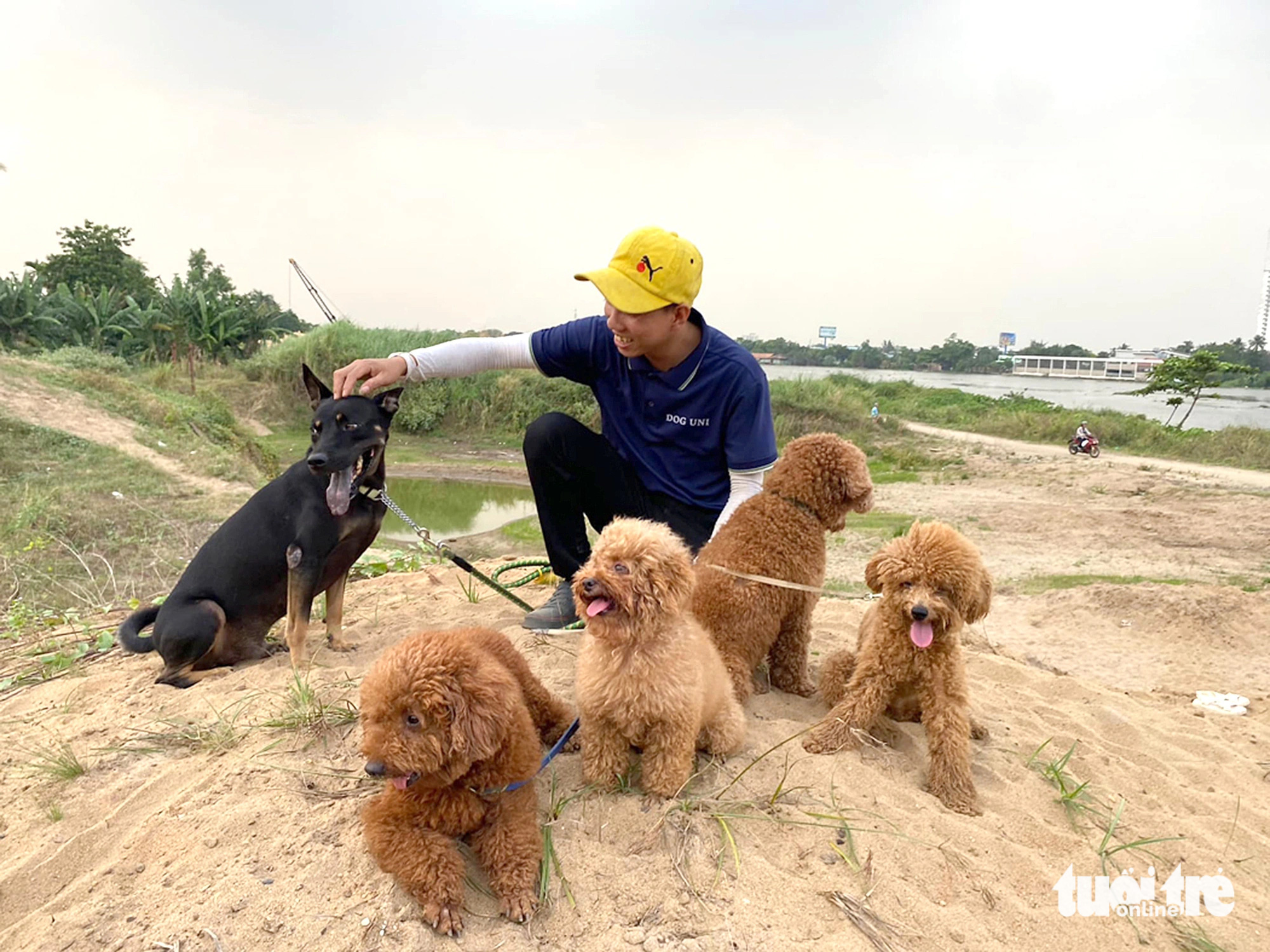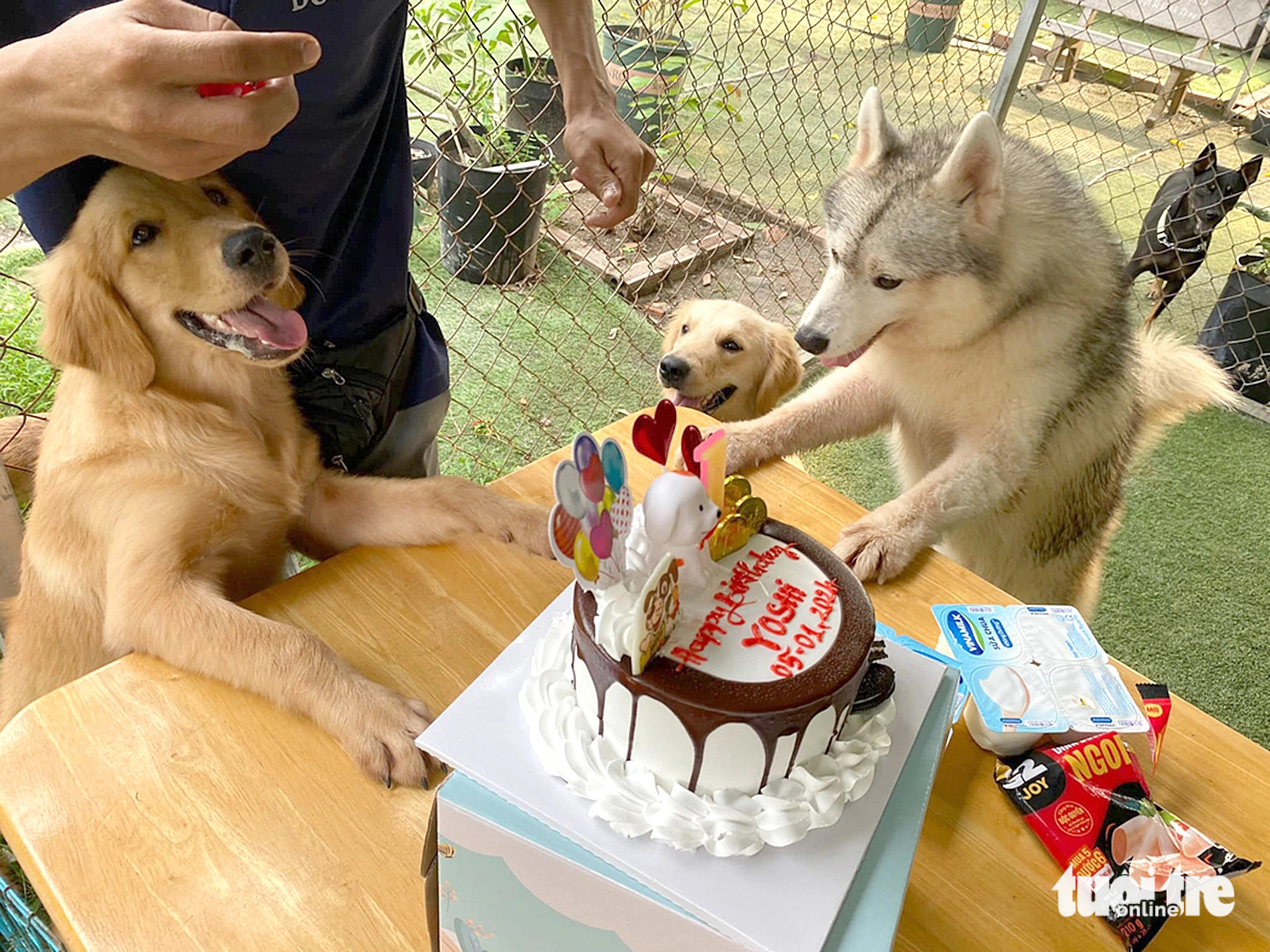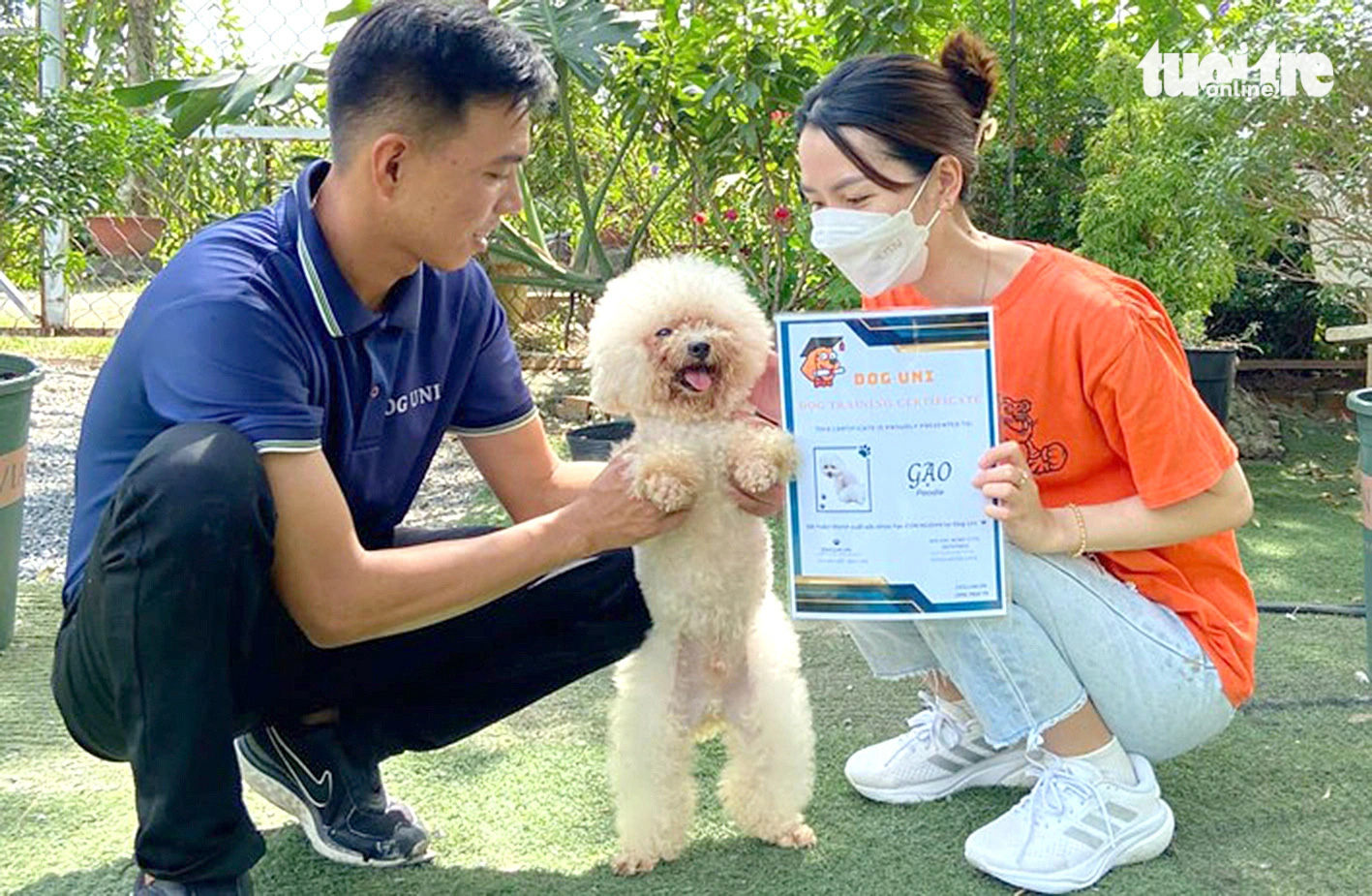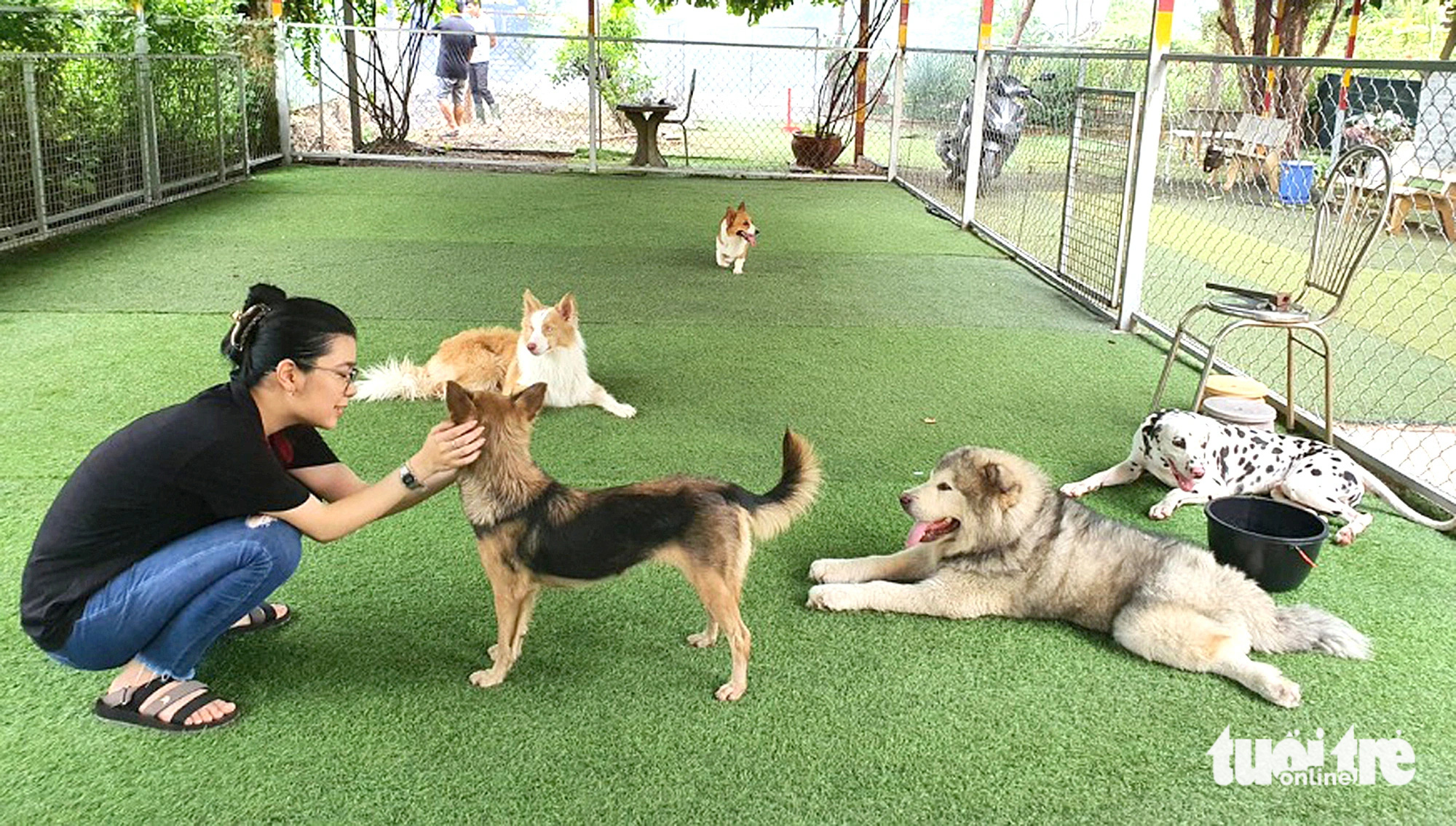Nestled in a shady garden by the Saigon River in District 12, Ho Chi Minh City, a space for puppy psychological treatment and training is filled with laughter, resembling a weekend entertainment spot.
Dog Uni, a training and care center for pets, was founded by the passionate couple Anh Huy, 32, and Thuy Linh, 29, in District 12.
This peaceful facility spans 2,000 square meters and is divided into various areas tailored to different dog breeds, genders, weights, and personalities.
Puppies come here from diverse backgrounds for various reasons: taking courses, playing with friends over the weekend, staying while their owners are away, or receiving stress treatment.
On weekends, the atmosphere is cheerful and bustling, with dozens of puppies playing and running around the yard, always attentive to the main gate.
They eagerly rush to greet guests at the sound of a vehicle stopping or the sight of a visitor.
According to Anh Huy, urban pets often suffer from limitations due to confinement in townhouses and high-rise apartments.
For example, a puppy named Gau, who has been here for an extended period, is quite chubby and limps due to overfeeding and lack of exercise, resulting in nearly complete loss of hearing and smell.
Urban dogs frequently lose their natural skills and can become more aggressive than their rural friends of the same breed.
Limited space for exercise can lead to stress and depression.
Moreover, some owners mismanage their pets, encouraging bad behavior or even resorting to physical punishment, causing the dogs to become aggressive, stubborn, and prone to biting.
 |
| Dogs are taken for walks along the riverbank by a trainer from Dog Uni in District 12, Ho Chi Minh City. Photo: Chung Thanh Huy / Tuoi Tre |
“Many unfortunate accidents occur because dog owners have no knowledge about the breed they are raising,” Thuy Linh shared.
“Some breeds are designed for hunting or fighting, making them difficult to domesticate and care for like a pet.”
Training for good behaviors
“The primary requirement for acceptance into the center is that the dog must have a certificate proving it has received all necessary vaccinations,” Anh Huy explained.
Prior to this, the staff and clients have discussions to agree on training timelines, objectives, and to provide essential information about the dog’s preferences and habits.
Depending on the dog’s age and breed, the time needed to connect with the trainer varies.
Younger puppies acclimate to new environments more quickly.
After eight to 10 months, a dog’s personality is nearly fully developed, making it harder to bond with strangers, sometimes extending the training period to two to three weeks or even a month.
“Puppies between six and 12 months are the easiest to train,” Trong Tran, a puppy trainer, said.
“While dogs of other ages can also learn, their progress may be slower.
“Training methods should vary based on each puppy’s temperament; gentle and shy puppies benefit from encouragement and affection, while more stubborn ones may require different approaches.”
In the early morning, the dogs have a bathroom break before feeding.
Each day, given cool weather, small groups of puppies are taken for walks along the riverbank.
 |
| A birthday celebration is held for the dogs at Dog Uni in District 12, Ho Chi Minh City. Photo: Chung Thanh Huy / Tuoi Tre |
Training sessions are held from Monday to Friday, with Fridays also designated for grooming and bathing.
On weekends, the puppies enjoy free playtime or visits from their families.
Families also come to celebrate their dogs’ birthdays, which are filled with cakes, candies, yogurt, and sausages.
Meals are divided into several servings throughout the day.
Puppies aged three to four months are fed three to four times daily, as they require more nutrition for growth.
From one year old, they are fed twice a day.
During their training, the puppies learn essential lessons, including proper bathroom habits, avoiding unfamiliar food and dropped snacks, basic commands like stand, walk, lie down, sit, roll over, greet, shake hands, and roll.
They also learn protective rules for their owners and belongings, how to walk alongside their owners, respond to commands to bark, and manage signs of depression, such as excessive barking or aggression toward strangers.
Their 'syllabi' also includes riding on a motorcycle and transforming a hyperactive dog into a calm one, or making a gentle dog more lively and active.
“Each puppy has unique and lovable traits, such as being playful, enjoying photos, and being easy to socialize or show off when guests arrive,” Thuy Linh noted.
“Most dogs that come here are initially shy and fearful in the unfamiliar, spacious environment.
“Over time, exposure and interaction with the trainer help build their confidence and integration.”
 |
| A dog receives a graduation certificate following their course completion at Dog Uni in District 12, Ho Chi Minh City. Photo: Chung Thanh Huy / Tuoi Tre |
The center has a dedicated team to connect with the puppy owners by providing health updates and daily activity photos, ensuring owners feel reassured no matter where they are.
“Patience is crucial in the training process,” said Anh Hieu, a puppy trainer.
“If an owner is hot-tempered, curses, or hits the dog, it will become fearful and avoid learning.
“Commands must be short, clear, decisive, and authoritative to ensure compliance, and they shouldn’t be skipped to maintain discipline.
“It’s important to allow at least 30 seconds between commands so the dog can process and respond.”
Each month, the dogs are taken home for three days so their families can assess the quality of training.
Dogs that have completed their courses are celebrated with graduation ceremonies alongside their families.
“Our goal is to develop a comprehensive service system that covers everything from dog training and care to essential products for proper pet ownership in urban areas, as well as for dog-loving families,” Anh Huy emphasized.
“We aim to make this place a second home, a funny playground for all dogs.”
Like us on Facebook or follow us on X to get the latest news about Vietnam!















































